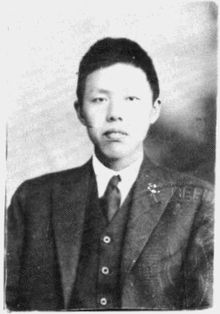Wu Youxun
Wu Youxun | |
|---|---|
 Wu in 1921 | |
| Born | 26 April 1897 |
| Died | 30 November 1977 (aged 80) Beijing, China |
| Alma mater | University of Chicago |
| Known for | Physics |
| Scientific career | |
| Institutions | Tsinghua University National Central University |
| Academic advisors | Arthur Compton |
Wu Youxun (simplified Chinese: 吴有训; traditional Chinese: 吳有訓; pinyin: Wú Yǒuxùn; Wade–Giles: Wu Yu-hsun; 26 April 1897[2] – 30 November 1977[3]), also known as Y. H. Woo,[4] was a Chinese physicist. His courtesy name was Zhèngzhī (正之).
Biography
[edit]Wu graduated from the Department of Physics of Nanjing Higher Normal School (later renamed National Central University and Nanjing University), and was later associated with the Department of Physics at Tsinghua University. He served as president of National Central University and Jiaotong University in Shanghai. When he was a graduate student at the University of Chicago he studied x-ray and electron scattering, and verified the Compton effect which gave Arthur Compton the Nobel Prize in Physics.
Awards
[edit]In 2000, the Chinese Physical Society established five prizes, in recognition of five pioneers of modern physics in China. The Wu Youxun Prize is awarded to physicists in nuclear physics.
References
[edit]- ^ Tsinghua University and Modern Chinese Science and Technology. Tsinghua University Press. 2006. pp. 43–. ISBN 978-7-302-12014-8.
- ^ Nie Leng (1998). The Biography of Wu Youxun. China Youth Publishing House. pp. 543–. ISBN 978-7-5006-3014-2.
- ^ Biographies of Modern Chinese Scientists. Science Press. 1991. pp. 108–. ISBN 978-7-03-002261-5.
- ^ Lawrence R. Sullivan; Nancy Y. Liu-Sullivan (19 March 2015). Historical Dictionary of Science and Technology in Modern China. Rowman & Littlefield Publishers. pp. 453–. ISBN 978-0-8108-7855-6.
- 1897 births
- 1977 deaths
- Boxer Indemnity Scholarship recipients
- Educators from Jiangxi
- Members of Academia Sinica
- Members of the Chinese Academy of Sciences
- Nanjing University alumni
- National Central University alumni
- Academic staff of the National Southwestern Associated University
- People from Yichun, Jiangxi
- Physicists from Jiangxi
- Presidents of National Central University
- Presidents of Nanjing University
- Presidents of Shanghai Jiao Tong University
- Academic staff of Shanghai Jiao Tong University
- Academic staff of Tsinghua University
- Physicist stubs
- Chinese scientist stubs
